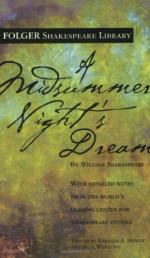|
This section contains 694 words (approx. 3 pages at 300 words per page) |

|
The Lunatic, Love and Poet in "A Midsummer Night's Dream"
Summary: In Act V of William Shakespeare's "A Midsummer Night's Dream," the character of Theseus muses on the lunatic, the lover and the poet and how they all live distorted realities of immense imagination. The three are on a continuum of reason ranging from the rational poet to the irrational lunatic.
At the beginning of Act V of William Shakespeare's A Midsummer Night's Dream, Theseus compares three different personas in a his monologue: The lunatic, the lover, and the poet. Of these he says, "Are of imagination all compact." What does he mean by this? With further analysis we see how the lunatic, the lover, and the poet, all live distorted realities, and all possess mighty imagination. Yet beyond the exalted trance-like state of the three, there are differences to note, both in the character and in its origin. While the trio shares a mighty use of the imagination, they are conscious on different levels. Furthermore, they are very different personas outside of the delirious ambience and bizarre atmosphere which makes them appear similar the one to the other.
One the one end of the spectrum of reason we have the poet, who's imagination "bodies forth the forms of...
|
This section contains 694 words (approx. 3 pages at 300 words per page) |

|


